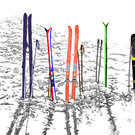Light a fire for learning
“The mind is not a vessel to be filled, but a fire to be kindled.”
— Plutarch
Sometimes, of late, American educational leaders — or at least those purporting to be — are so focused on numbers that the essence of learning is forgotten.
New Yorkers are consumed with the numbers from test scores — numbers that are used to measure not only students’ progress but teachers’ worth.
Scores recently released on tests taken by students in third through eighth grades are down not because students suddenly became stupid — over half aren’t considered proficient in math or English — and not just because, as the education commissioner has asserted, that standards have been raised. Rather, the tests were given on materials that weren’t taught, and the exams aren’t constructed in a way that would accurately reflect the new Common Core Standards once they are taught.
Local school leaders are necessarily consumed with numbers, too — budget numbers. As state and federal aid has dwindled in recent years, health-care and pension costs have soared, property values have remained stagnant, and taxpayers feel strapped. All this has led to cuts, of school staff and of programs.
Often, the so-called “extras” are first on the chopping block. Depending on the district, this can range from sports to the arts.
So, we went back to school this week to be enlightened by the students. We visited Guilderland High School on Friday, the first day of class, to get away from the numbers. We listened in on a choral rehearsal in the early afternoon. Eighty students sat in rapt attention with two minutes to absorb a new piece of sheet music. No one was messing around.
“Pay attention to the rhythms,” said their teacher, Rae Jean Teeter, before they began singing “Peace, a Shaker song from the 1850s.”
“The faster you read it, the faster you internalize it,” said Leonard Bopp, a junior who leads the bass section, after the rehearsal. “Learning the notes and rhythm is only step one,” he told us. “After that, you’re not reading, you’re channeling — you let it out through your voice or your instrument,” said Bopp, who plays the trumpet and plans to pursue that in college.
We were at the school to write a story because the chorus has been invited to sing at Carnegie Hall, and needs money to get there. “It’s a chance to represent our school and community on one of the best stages in the world; it’s something our community can take pride in,” said Bopp.
“The fact that Guilderland High School gets the opportunity is amazing,” said Alanna Wilson, a senior who leads the altos. “So many kids want this but their school doesn’t have the – ” Her voice trailed off, as she searched for the word: “Ability?” “Privilege?” she asked.
“Privilege,” Bopp agreed.
As we talked to the students, what most impressed us, more than their musical abilities, was how they spoke about what they had learned from studying music; both have been in school choruses since they were in the fourth grade.
“It changes my mood a lot,” said Wilson of going to choir rehearsals. “I might be having a bad day, but I come to this room and my whole mood changes.” She feels uplifted.
“Music goes places where words can’t,” said Bopp.
“Mrs. Teeter encourages you to do all sorts of things out of your comfort zone, to take risks, to broaden your horizon,” said Wilson.
“Mrs. Teeter pushes us,” agreed Bopp. “It can inspire you to try new things in all aspects of your life.”
Standardized tests won’t measure these life lessons nor reflect the skill of the teacher imparting them.
Similar life lessons are taught on the playing field. Our sportswriter, Jordan J. Michael, this week has chronicled what many consider the worst part of school athletics — injuries.
“Kids think they’re untouchable, unbreakable, but they realize they aren’t,” said Kate Gawrys, the certified athletic trainer for Guilderland High School. That is certainly a difficult lesson to learn. But Gawrys goes on. “When they get injured,” she said, “they can’t see the end, but, with some goals, they can feel better.”
The struggles that Michael chronicles make us wince. What’s it like for the football team’s quarterback to break his leg in the very first game? “Someone took something special away from me,” said Joe Bender. “I worked so hard, and one play changed everything.”
But, after surgery, Bender didn’t quit the team. He still went to practices and games. “They were my brothers,” he said. And, he went on to excel at baseball.
Bender has some advice that would be good for any of us to follow: “You never know when the last play can happen, so always work your tail off. You should have no regrets when you’re doing anything.”
Tristan Wilson, while playing basketball for the Berne-Knox-Westerlo junior varsity team, broke his arm when he was knocked into trying to make a lay-up shot. “I’ve never seen anything like that,” said his coach, Andy Wright. “He came down and his arm snapped through the skin. It was like a war movie. His arm was shooting blood.”
A year later, with a rod in his arm, Wilson was playing on the varsity team. Why? “Mostly, it was Andy that gave me confidence,” he said of his coach. “He had my back the whole time. Coach Wright had confidence in me. He never scolded me.”
Jennifer Cillis, who played basketball for Voorheesville, tore a ligament in her knee but went on to play basketball again. Now a sophomore at Boston College, majoring in biology to become a doctor, she said, “My injury really solidified my interest in a medical career. I was so much better after surgery, I want to help to put people back together.”
The ability to learn and grow from the worst happenstance speaks volumes about resilience. Love of teammates, a coach’s backing, an ability to forge the future from past hurt — none of these can be measured by tests. All of them have come from a public-school education. We must be careful what we cut.
And we must be mindful of what Plutarch, the First-Century Greek scholar, wrote in the Moralia, when he expanded on the analogy that the mind is not a vessel that needs filling but, rather, like wood that needs igniting. “Suppose someone were to go and ask his neighbors for fire and find a substantial blaze there,” he wrote, “and just stay there continually warming himself: That is no different from someone who goes to someone else to get some of his rationality, and fails to realize that he ought to ignite his innate flame, his own intellect….”
True education — like Rae Jean Teeter’s inspiring her students to go beyond where they thought they could, or Andy Wright’s instilling confidence after a grievous wound — motivates one towards originality and sustains one for a lifetime.
— Melissa Hale-Spencer


